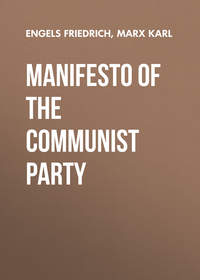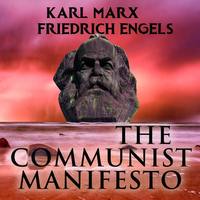 полная версия
полная версияLandmarks of Scientific Socialism: "Anti-Duehring"
It is the same also in mathematics. Let us take an ordinary algebraic quantity a. Let us negate it, then we have-a (minus a). Let us negate this negation, that is let us multiply – a by – a and we have + a², that is the original positive quantity but in a higher form that is to the second power. It does not matter that we can attain the same a² by the multiplication of a positive by itself. The negated negation is established so completely in a² that under all circumstances it has two square roots a and – a. And this impossibility, the negated negation, the getting rid of the negative root in the square has much significance in quadratic equations. The negation of the negation is more evident in the higher analyses, in those "unlimited summations of small quantities," which Herr Duehring himself explains as being the highest operations of mathematics and which are usually called the differential and integral calculus. How do these forms of calculation fulfil themselves? I have for example in a given problem two variable quantities x and y, of which one cannot vary without causing the other to vary also under fixed conditions. I differentiate x and y, that is I consider x and y as being so infinitesimally small that they do not represent any real quantities, even the smallest, so that, of x and y nothing remains, except their reciprocal relations, a quantitative relation without any quantity; therefore dx/dy, the relation of the two differentials of x and y, is 0/0 but 0/0 is fixed as the expression of y/x. That this relation between two vanished quantities, the fixed moment of their vanishing, is a contradiction I merely mention in passing, it should give us as little uneasiness as it has given mathematics for the two hundred or so years past. What have I done except to negate x and y; not as in metaphysics so as not to trouble myself any further about them, but in a manner demanded by the problem? Instead of x and y, I have therefore their negation dx and dy in the formulæ or equations before me. I now calculate further with these formulæ. I treat dx and dy as real quantities, as quantities subject to certain exceptional laws, and at a certain point I negate the negation, that is, I integrate the differential formula. I get instead of dx and dy the real quantities x and y again, and am thereby no further forward than at the beginning, but I have thereby solved the problem over which ordinary geometry and algebra would probably have gnashed their teeth in vain.
It is not otherwise in history. All civilised peoples began with common property in land. Among all peoples which pass beyond a certain primitive stage the common property in land becomes a fetter upon production in the process of agricultural development. It is cast aside, negated, and, after shorter or longer intervening periods, is transformed into private property. But at a higher stage, through the development still further of agriculture, private property becomes in its turn a bar to production, as is to-day the case with both large and small land proprietorship. The next step, to negate it in turn, to transform it into social property, necessarily follows. This advance however does not signify the restoration of the old primitive common property, but the establishment of a far higher better developed form of communal proprietorship, which, far from being an impediment to production, rather, for the first time is bound to put an end to its limitations and to give it the full benefit of modern discoveries in chemistry and mechanical inventions.
But again; ancient philosophy was primitive naturalistic materialism. In the state of thought at that period it was, as such, incapable of clear conceptions of matter. But the necessity of clearness on this point led to the doctrine of a soul which could leave the body, then to the idea of the immortality of the soul, finally, to monotheism. The old materialism was therefore negated by idealism. But in the further development of philosophy idealism became untenable, and is negated by modern materialism. This, the negation of negation, is not the mere reestablishment of the old, but unites, with the surviving foundations, the whole thought content of a two thousand years' development of philosophy and science, as well as the history of these two thousand years. It is in a special sense no philosophy but a single concept of the universe which has to prove and realise itself not in a science of sciences apart, but in actual science. Philosophy is here also cast aside, that is "destroyed and preserved," destroyed as to its form, preserved as to its real content. Where Herr Duehring only sees word-jugglery a more real content is brought to light by the newer point of view.
Finally, even the Rousseau doctrine of equality, of which that of Herr Duehring is only a feeble and false plagiarism, has no existence unless the Hegelian negation of the negation serve it as a midwife, although it originated twenty years prior to the birth of Hegel. Far from being ashamed of this it bears in plain sight the stamp of its dialectic derivation in its earliest manifestation. In a state of nature and savagery men were equal, and, since Rousseau regards speech as a falsifying of natural conditions, he is quite right in predicating equality of animals of one species as far as this reaches, and the same also with regard to those speechless animal-men, recently hypothetically classified by Haeckel as Alali. But these equal animal men had one quality beyond the other animals, – perfectibility, the power of further development and this was the reason of inequality. Rousseau sees therefore in the existence of equality a step forward. But this advance was self contradictory, it was at the same time a retrogression. "All further advances (beyond the primitive stage) were so many steps, seemingly in the development of individual men, but actually in the decay of the species. Working in metals and agriculture were the two arts whose discovery brought about this great revolution" (the transformation of the primitive forests into cultivated lands, but also the introduction of poverty and slavery together with private property). "The poets hold that gold and silver, the philosophers that iron and corn have civilised men and ruined the human race." Each new advance of civilisation is at the same time an advance of inequality. All contrivances with which society endows itself by means of civilisation are in direct opposition to their original purpose. "It is beyond question and a foundation principle of the entire public law that people made rulers to defend their liberties, not to destroy them." And yet these rulers become of necessity the oppressors of the people and they carry the oppression to the point where inequality is brought to a climax and, then, transformed into its opposite, again becomes the reason of equality, for to despots all are equal, that is equally of no account. Here is the extreme of inequality, the crowning point which closes the circle, and touches the point from which we have proceeded; here all private individuals are equal, since they are of no account, and subjects have no law other than the will of their master. "But the despot is master only as long as he has the power, and for this reason he cannot complain of the use of force if he is banished… Force upholds him, force throws him down, everything goes according to a straight and naturally appointed path." And thus again inequality is transformed into equality, but not into the old materialistic equality of speechless, primitive men, but into the higher equality of organised society. The oppressor is oppressed, it is negation of the negation.
We have then, as regards Rousseau, not merely a method of thought which is quite analogous to that pursued in Marx's "Capital," but also a whole series of single dialectic turns of which Marx avails himself: Processes, which are antagonistic in their nature, containing a contradiction in themselves, are transformed from one extreme to its opposite, finally, as the quintessence of the whole, negation of the negation. Although Rousseau in 1754 could not speak the jargon of Hegel, he was then, at a period twenty-three years before the birth of Hegel, deeply infected with the Hegel contagion, the dialectic of contradiction, doctrine of logic, theology, etc. And if Duehring in his misapplication of Rousseau's theory of equality, operates with his two victorious men, he having lost his feet, falls, of necessity into the arms of the negation of the negation.
The conditions under which the equality of the two men flourishes and which is set forth as an ideal condition is shown on page 271 of the Philosophy as the original condition. This original condition on page 279 is of necessity destroyed by the "robber system" – first negation. But we have now, thanks to the philosophy of reality, arrived at the point of abolishing the "robber system" and substituting for it the economic commune discovered by Herr Duehring – negation of the negation, equality on a higher plane.
What is the negation of the negation, therefore? It is a very far reaching, and, just, for this reason, a very important law of development of nature, human history and thought, a law which we see realised in the animal and vegetable kingdoms, in geology, in mathematics, in history, and philosophy, and which Herr Duehring himself, in spite of his opposition and resistance, must follow, after his own fashion. It is evident that I say nothing of the special development of the grain of barley from the germ to the crop bearing plant, if I say it is negation of the negation. Since the integral calculus is likewise negation of the negation, with the other assertion I should only affirm that the life process of a grain of barley is integral calculus or even socialism. But that is just the kind of thing which the metaphysicians push off on the dialectic. If I say that all these processes constitute negation of the negation, I embrace them all under this one law of progress, and leave the distinctive features of each special process without particular notice. The dialectic is, as a matter of fact, nothing but the science of the universal laws of motion, and evolution in nature, human society and thought.
At this point, however, the objection may be urged that the final negation is no true negation, I negate a grain of barley also when I grind it, an insect when I crush it, a positive quantity when I eliminate it, etc. Or I negate the statement "the rose is a rose" if I say "the rose is no rose" and what happens if I negate this negation again and say "but the rose is a rose"? These objection are, in fact, the chief arguments of the metaphysicians against the dialectic and are quite worthy of this idiotic method of reasoning. To negate in the dialectic is not simply to say "No," or to describe a thing as non-existent, or to destroy it after any fashion that you may choose. Spinoza says "omnis determinatio est negatio," every limitation or determination is at the same time a negation. Furthermore, the sort of negation here is shown first by means of the universal and in the second place by means of the distinctive nature of the process. I must not only negate but I must also restore the negation again. I must therefore so direct the first negation that the second remains possible or shall be so. How? Just according to the peculiar nature of each particular case. I grind a grain of barley, I crush an insect, I have certainly fulfilled the first act but have made the second impossible. Every species of things has therefore its own peculiar properties to be negated in order that a progression may proceed, and every species of properties and ideas is precisely the same in this regard. In infinitesimal calculations the negation is brought about after a different fashion than in the restoration of positive powers from negative roots. That has to be learnt like everything else. With the mere knowledge that the stalk of barley and infinitesimal calculation fall under the principle of the negation of the negation, I cannot cultivate more barley nor can I differentiate and integrate, just as I cannot play the violin by virtue of a mere knowledge of the laws of harmony. But it is evident that a merely childish negation of the negation such as writing down a and erasing it, or by affirming that a rose is a rose and that it is not a rose leads to no conclusion other than to show the silliness of the people who undertake processes so tedious. And yet metaphysicians would inform us that that is the right way to carry out the negation of the negation.
Herr Duehring is therefore a mystifier when he asserts that the negation of the negation was an analogy made by Hegel derived from religion and built up on the story of the Fall and the Redemption. Men thought dialectically a long time before they knew what the dialectic really was, just as they spoke prose a long time before the term "prose" was used. The law of the negation of the negation which operates in history and which until it is once learned goes on in our brains unconsciously to ourselves, was first clearly formulated by Hegel, and if Herr Duehring desires to employ it in secret but cannot stand the name, he should discover a better name. But if he insist on expelling it from the processes of thought, he must first be good enough to expel it from nature and from history, and find a system of mathematics in which – a multiplied by – a does not give us + a² and where the differential and integral calculus are both forbidden by law.
ConclusionIn this short section Engels leaves the general discussion in order to again pay his respects to the shortcomings and deficiencies of Herr Duehring. The matter possesses no general interest for Engels merely teases his opponent upon the magnificence of his claims and the slightness of his performances.
PART II
CHAPTER VIII
POLITICAL ECONOMY
I. Objects and MethodsPolitical economy is, in the widest sense, the science of the laws controlling the production and exchange of the material necessities of life in human society. Production and exchange are two entirely different functions. Production may exist without exchange, exchange – since there can only be exchange of products – cannot exist without production. Each of the two social functions is controlled by entirely different external influences and thus has, generally speaking, its own peculiar laws. But on the other hand they become so mutually involved at a given time and react one upon the other that they might be designated the abscisses and ordinates of the economic curve.
The conditions under which men produce and exchange develop from land to land, and in the same land from generation to generation. Political economy cannot be the same for all lands and for all historical epochs. From the bow and arrow, from the stone knife and the exceptional and occasional trading intercourse of the barbarian to the steam engine with its thousands of horse-power, to the mechanical weaving machine, to the railway and the Bank of England is a tremendous leap. The Patagonians do not have production on a large scale and world-commerce any more than they have swindling or bankruptcy. Anyone who should attempt to apply the same laws of political economy to Patagonia as to present-day England would only succeed in producing stupid commonplaces. Political economy is thus really a historical science. It is engaged with historical material, that is, material which is always in course of development. At the close of this investigation it can, for the first time, show the few (especially as regards production and exchange) general laws which apply universally. In this way it is made evident that the laws which are common to certain methods of production or forms of exchange are common to all historical periods in which these methods of production and forms of exchange are the same. Thus for example with the introduction of specie, there came into being a series of laws which holds good for all lands and historical epochs in which specie is a means of exchange.
The method of distributing the product is in accordance with the method of production and exchange of a given society at a given time. In the tribal or village community with communal ownership of land, of which there are obvious survivals in the history of all civilized peoples, there is practically an equal distribution; where a greater inequality of distribution of the product has been introduced among the members of a society, it is a sign of the coming dissolution of the community – large and small farming have very different modes of distribution according to the historical circumstances from which they have developed. But it is apparent that large farming requires a different mode of distribution than small farming; that the large farming shows the existence of class antagonism – slave-holders and slaves, landlords and tenants, capitalists and wage workers, – but that, on the contrary, in small farming, class distinction does not arise from the farming operations of separate individuals but from the mere beginnings of farming on a large scale. The introduction and development of the use of gold into a country where formerly exchange of actual goods was the exclusive or general practice, is closely associated with a slow or rapid revolution of the mode of distribution hitherto prevailing, and to such an extent that inequality of distribution among individuals and, so, antagonism between rich and poor becomes more and more apparent. Local gild hand-production as it prevailed in the Middle Ages made great capitalists and life-long wage-workers just as impossible as the great modern industry, the credit system of to-day, and form of exchange, corresponding with the development of these, free competition, render them inevitable.
With the difference in distribution however class differences are introduced. Society becomes divided into upper and lower classes, into plunderers and plundered, into master and servant classes, and the state which the original groups composed of societies claiming the same ancestry only regarded as a means of protection of the common interests (remnants of which remain in the Orient, e.g.) and against foreign force, takes upon itself the duty of maintaining the economic and political supremacy of the dominant class against the dominated class by means of force.
So distribution is not a mere passive witness of production and exchange; it has an immediate influence on both. Every new method of production and form of exchange is impeded, not only through the old forms and their particular forms of political development, but also through the old method of distribution. It can only bring about its own method of distribution as the result of long conflict. But just in proportion as a given method of production and exchange is built up and develops, distribution all the more rapidly reaches a point where it outstrips its predecessor and where it comes into collision with the system of production and exchange existing up to that time. The old tribal communistic forms of which we have already spoken may last thousands of years, as is seen in the case of the Indians and Slavs of to-day, until intercourse with the outside world develops causes of disruption within them as a conclusion of which their dissolution comes about. Modern capitalistic production on the other hand which is hardly three hundred years old and which first became dominant with the introduction of the greater industry about one hundred years ago, has, in this short time, developed antagonisms in distribution – concentration of capital on the one hand in the possession of a few persons and, on the other, concentration of propertyless masses in the great cities – which must of necessity bring it to an end.
The connection between the form of distribution and the material economic conditions of a society is so much in the nature of things that it is generally reflected in the popular instinct. As long as a method of production is in the course of development, even those whose interests are against it, who are getting the worst of the particular method of production, are highly satisfied. It was just so with the English working class at the introduction of the greater industry. As long as this method of production remained the normal social method, satisfaction with the methods of distribution was, on the whole, prevalent; and when a protest against it rose even in the bosom of the dominant class itself (Saint-Simon, Fourier, Owen) it found at first practically no sympathy among the masses of the exploited. But directly the method of production has travelled a good portion of its upward progress, when half of its life was over, when its destiny was in a great measure accomplished and its successor was knocking at the door – then for the first time the ever increasingly unequal distribution appeared as unjust. Then was the first appeal made from actual facts to so-called eternal justice. This appeal to morality and justice does not bring us a step further scientifically. Economic science can find no grounds of proof in moral indignation, however justifiable, but merely a symptom. Its task is to show the newly developing social wrongs as the necessary results of existing methods of production and, at the same time, as signs of its approaching dissolution, and to point out, amid the break up of the existing economic system, the elements of the new organization of production and exchange which will abolish those social wrongs. The feeling stirred up by the poets whether in the picturing of these social wrongs or by attack upon them or, on the other hand, by denial of them and the glorification of harmony in the interests of the dominant class, is quite timely, but its slight value as furnishing proof for a given period is shown by the fact that one finds an abundance of it in every epoch.
Political economy, as the science of the conditions and forms under which various human societies have produced and exchanged and according to which they have distributed the products of their labor, – political economy, in this broad sense, has yet to be planned for the first time. All that we have so far of political economic science is almost entirely limited to the beginning and development of the capitalistic mode of production. It begins with the genesis and growth of the capitalistic mode of production, and exchange, recognises the necessity of the disappearance of these by means of the capitalistic forms, then develops the laws of the capitalistic methods of production and their corresponding forms of exchange on the positive side, that is on the side on which they further the objects of society, as a whole and closes with the socialist criticism of the capitalistic methods of production, that is, with the exhibition of its laws on the negative side, with the proof that this method of production arrives at the point, by its own development, where it is no longer possible. This criticism proves that the capitalistic methods of production and exchange constitute more and more an insufferable fetter upon production itself. The mode of distribution which is necessarily associated with this form of production has brought about a class condition which grows daily more unbearable. It has produced the daily sharpening antagonism between the continually less numerous but constantly richer capitalists and the more numerous, but on the whole, continually poorer propertyless wage-workers. Finally the tremendous productive forces of the capitalistic methods of production, which are practically unlimited, are only awaiting their seizure at the hands of an organized co-operative society to secure for all the members of that society the means of existence and the fuller development of their faculties in an ever increasing degree.
In order to fully accomplish this criticism of the bourgeois economy acquaintance with the capitalistic form of production of exchange and of distribution was not enough. Preceding forms and others, existing side by side with the capitalistic mode in a few highly developed countries, had to be examined and compared at least in their chief features. Such an investigation and comparision has been undertaken as a whole by Marx alone and we consider that this investigation practically sums up all that has been established respecting theoretical economy prior to that of the bourgeois.
While political economy in a narrow sense arose in the minds of a few geniuses of the seventeenth century, it is, in its positive formulation by the physiocrats and Adam Smith, substantially a child of the eighteenth century, and expresses itself in the acquisitions of the great contemporary French philosophers with all the excellencies and defects of that time. What we have said of the French philosophers applies also to the economists of that day. The new science was with them not the expression of the condition and needs of the time but the expression of eternal reason; the laws of production and exchange discovered by them were not the laws of a given historical form of those facts but were eternal natural laws; they derived them from the nature of man. But this man, seen clearly, was a burgher of the Middle Ages on the high road to becoming a modern bourgeois, and his nature consisted in this that he had to manufacture commodities and carry on his trade according to the given historical conditions of that period.






